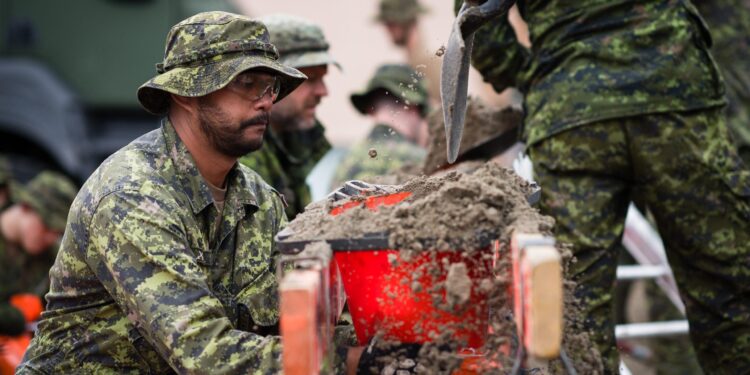In response to escalating security concerns prompted by Russia’s actions in Eastern europe, Poland is considering the reintroduction of mandatory military service for its citizens. This move, if realized, would mark a significant shift in the country’s defense policy amid a turbulent geopolitical landscape. As tensions rise and the specter of aggression looms, Polish officials are weighing the potential benefits of a conscripted military force to bolster national security and readiness. This article explores the implications of reinstating compulsory service,the current security climate in the region,and the broader context of Poland’s defense strategy as it navigates the challenges posed by its formidable neighbor.
Poland’s Security Landscape and the Rising Russian Threat
The geopolitical landscape in Eastern Europe has become increasingly volatile, prompting Poland to reassess its defense strategies. As the specter of Russian aggression looms larger, the Polish government is considering the reinstatement of mandatory military service. This move is fueled not only by ancient memories of conflict but also by recent developments that highlight the need for a robust military presence. Poland’s strategic location, sharing borders with both Belarus and Ukraine, positions it at the forefront of potential confrontations, thereby necessitating a readiness to mobilize its citizenry in the name of national security. Key elements informing this decision include:
- Increased military exercises by Russia: Frequent drills near NATO borders raise concerns about preparedness.
- Support for Ukraine: Poland’s involvement in bolstering Ukraine’s defenses underscores its commitment to regional stability.
- Public sentiment: growing awareness among Polish citizens about the potential threats has cultivated a desire for a more involved citizenry.
The implications of reinstating draft service could far-reaching effects on both military readiness and societal structure. A conscription system could serve as a stabilizing factor, building a sense of national unity while equipping citizens with essential skills and knowledge necessary for defense. By creating a well-trained reserve force,Poland could enhance its deterrent posture against external aggression.The potential framework for this initiative could outline:
| proposed Changes | Expected Benefits |
|---|---|
| Mandatory military service | Increased troop numbers and readiness |
| Enhanced training programs | Higher skill levels among servicemen and women |
| Wider public involvement | strengthened national identity and solidarity |
Historical Context of Military Service in Poland
Poland’s military history is deeply intertwined with the nation’s struggle for sovereignty and security. Since its establishment in the 10th century, Poland has faced numerous conflicts, leading to significant shifts in its military practices. The partitions of the late 18th century stripped Poland of its independence, and the country only regained sovereignty after World War I. The interwar period saw efforts to modernize the military, culminating in a defensive stance during World war II when Poland was invaded by both Nazi Germany and the Soviet Union. This history of external threats has ingrained a strong sense of patriotism and military readiness among the Polish populace.
In contemporary times, the reinstatement of mandatory military service reflects Poland’s response to evolving security challenges, especially the aggressive posturing of Russia in eastern Europe. Military conscription is viewed as a strategic measure to bolster national defense capabilities. Key elements include:
- Historical Commitment: A long-standing tradition of defending the homeland.
- Regional Security: Concerns over Russian military actions in Ukraine and Belarus.
- Modernization Efforts: A focus on upgrading military training and technology.
The potential policy shift aligns with broader trends within NATO, as member states reassess their defense strategies in light of increased tensions. The polish government aims to enhance public support for this initiative by emphasizing the need for national resilience and the importance of a well-prepared citizenry.
Public Opinion on Mandatory Military Service Resurgence
A recent survey indicates a significant shift in Polish public sentiment towards military preparedness, driven largely by escalating tensions in Eastern Europe. The rise of military threats, particularly from Russia, has catalyzed discussions about reinstating mandatory military service. In a poll conducted by a reputable national research firm, 62% of respondents expressed support for conscription as a necessary measure to bolster national security. This shift reflects not only a desire for enhanced defense capabilities but also a growing recognition of the importance of preparedness in the face of uncertain geopolitical dynamics.
Conversations around mandatory military service have sparked diverse opinions across various demographics.Supporters argue that such a policy would help instill discipline, foster unity, and prepare a more resilient citizenry. However, detractors warn that mandatory service could infringe on personal freedoms and may not sufficiently address the complexities of modern warfare. to better understand this divide, key points from recent discussions include:
- Historical Context: Poland has a history of compulsory military service that ended in 2009.
- National Security: Advocates cite that the current geopolitical climate necessitates increased defense efforts.
- Social Unity: Many believe serving together can bridge societal divides.
- Logistical Challenges: Concerns regarding effective implementation and resource allocation persist.
Assessing the Military Capabilities of Poland against Regional risks
As Poland navigates a changing security landscape in Eastern Europe, the need to assess its military capabilities in light of increasing regional risks is paramount.The resurgence of Russian aggression has prompted discussions about strengthening national defense mechanisms, including the potential reinstatement of mandatory military service. This consideration reflects a broader recognition that a well-prepared military is essential for ensuring sovereignty and responding effectively to external threats. Key elements of Poland’s military capabilities include:
- Modernized Armed Forces: Ongoing upgrades to equipment and technology, enhancing operational readiness.
- Strategic Alliances: Strengthening NATO ties to ensure collective defense capabilities and deter potential aggression.
- Expanded Training Programs: Increased focus on military exercises to improve coordination and response times in crisis situations.
In evaluating these capabilities, it is essential to weigh the geopolitical context. poland’s geographical position makes it a frontline state in any potential conflict involving Russia,which necessitates a complete defense strategy. Assessing potential threats requires an understanding of the regional military balance. A brief overview of the current military climate includes:
| Country | Military Strength | Regional Threat Level |
|---|---|---|
| Poland | 150,000 active personnel | Medium |
| Russia | 1,000,000 active personnel | High |
| Germany | 184,000 active personnel | Low |
| Ukraine | 250,000 active personnel | Medium |
This analysis underscores the complexity of Poland’s security habitat, emphasizing the necessity for enhanced military readiness amidst the evolving geopolitical dynamics of Eastern Europe.
Implications for NATO: Poland’s Role in collective Defense
As the geopolitical landscape shifts in Eastern Europe, Poland’s potential reinstatement of mandatory military service underscores its increasing significance within NATO’s collective defense framework. Facing a resurgence of aggressive posturing from Russia, Poland is taking proactive measures to bolster its military readiness. This move is not just about national security; it also reflects Poland’s commitment to NATO’s principle of collective defense, particularly Article 5, which asserts that an attack on one member is considered an attack on all. Poland’s enhanced military capacity could serve as a deterrent, reassuring neighboring countries and reinforcing the alliance’s deterrent posture against potential aggression.
Furthermore, Poland’s strategic location as a frontline state in NATO’s eastern flank positions it as a critical player in the alliance’s defense strategy. The expected increase in troop readiness and enhanced military training can lead to more integrated operations with NATO allies. Key implications include:
- Increased Military Cooperation: Joint exercises and coordinated defense plans among NATO members can enhance regional security.
- Resource Allocation: Poland may receive increased support and resources from NATO, facilitating modernization of its armed forces.
- Regional Leadership: Poland’s proactive stance can position it as a leader in Eastern European defense discussions, advocating for a robust NATO response.
Ultimately, Poland’s steps towards reinstating military service not only reflect a national security imperative but also symbolize the strengthening of NATO’s internal cohesion in the face of external pressures. This collective approach will be pivotal in shaping the alliance’s future response strategies against evolving threats.
Economic Considerations of Reinstating Military Service
The decision to reinstate mandatory military service in Poland brings forth several economic implications that warrant careful examination. Direct costs associated with such a program include the recruitment,training,and equipping of military personnel,which can strain the national budget. Along with these immediate expenses, there are potential long-term investments required in infrastructure to support military facilities and housing for conscripts.Such increased government spending could lead to a redistribution of resources, diverting funds from essential domestic programs like education, healthcare, and social services.
On the flip side,a reinstatement of military service could stimulate specific sectors of the economy. For exmaple, companies involved in defense contracting, manufacturing uniforms, and producing military equipment could see a surge in demand, perhaps leading to job creation and growth in those industries. Moreover, the training of young individuals could enhance their skills and employability, thus contributing to a more robust labor force.Though, the societal costs of mandatory service, including its impact on young people’s career paths and educational opportunities, should also be weighed when considering the overall economic landscape.
| Economic Factors | Considerations |
|---|---|
| Direct Costs | Recruitment, training, infrastructure |
| Long-term Investments | Military facilities, housing |
| Sector Growth | Defense contracting, manufacturing |
| Labor Force Impact | Skill enhancement and employment |
| Societal Costs | Career and education interruptions |
Youth Engagement and the Path to Military Readiness
The proposal to reinstate mandatory military service in Poland has ignited discussions about the crucial role of youth in national defense. With the looming threat from Russia, engaging young citizens in military training not only enhances national security but also instills a sense of duty and patriotism. This shift reflects a broader understanding that a prepared and resilient military force requires the active participation of its youth, who are increasingly seen as a vital resource. By involving them in such initiatives, Poland aims to create a well-rounded strategy for military readiness that encompasses various aspects of modern warfare.
Beyond mere training, the reintroduction of compulsory service offers numerous benefits that extend to personal advancement and societal cohesion. Young individuals can gain valuable skills such as leadership,teamwork,and discipline,which are essential both in military contexts and civilian life. Moreover, fostering a culture of engagement among the youth can yield a more robust and connected society. Key advantages of youth military engagement include:
- Skill Development: Acquisition of technical and interpersonal skills.
- Strengthened Community bonds: Building a sense of unity and shared purpose.
- Civic Obligation: Encouraging active citizenship and awareness of national issues.
Training and Resources: Preparing the Next Generation of Soldiers
The potential reinstatement of mandatory military service in poland signals a proactive shift in defense strategy, especially in light of the growing tensions in Eastern Europe. The polish government recognizes the necessity of equipping its citizens with essential skills and knowledge to confront contemporary threats. As such, there will be a focus on developing comprehensive training programs that emphasize physical preparedness, tactical proficiency, and mental resilience. Key components of these programs are likely to include:
- Basic combat training – to familiarize recruits with military protocols and tactics.
- First aid and survival skills – essential for both combat and civilian scenarios.
- cybersecurity awareness – educating soldiers about modern warfare’s digital aspects.
- Leadership training – nurturing decision-making skills and teamwork among recruits.
Additionally,resources will be allocated to enhance educational institutions that support military training. Partnerships between military academies and civilian educational bodies can definitely help bridge the gap between formal education and practical military experience. A structured curriculum can include:
| Program Component | Description |
|---|---|
| workshops | Interactive sessions on military strategy and history. |
| Field exercises | Hands-on training in realistic scenarios to build confidence. |
| Guest lectures | Insights from veterans and military experts. |
| physical fitness programs | Routine exercises aimed at enhancing endurance and strength. |
Through these initiatives, Poland is not only responding to immediate security concerns but also fostering a culture of preparedness and responsibility among its youth.By investing in training and resources, the nation aims to cultivate a new generation of capable soldiers equipped to defend their homeland amidst an increasingly volatile geopolitical landscape.
Potential Impact on Civil Society and Volunteerism
The potential reinstatement of mandatory military service in Poland could considerably shift the landscape for civil society and volunteerism within the country. As citizens brace for the realities of conscription, several aspects of community engagement may change, including:
- Increased Volunteer Opportunities: With many individuals possibly drafted into military service, non-profits and civil organizations may see a rise in demand for volunteers to fulfill essential roles within communities.
- Youth Engagement: the youth may be galvanized to participate in civic activities, focusing on advocacy, education, or preparedness initiatives that align with national defense goals.
- Impact on Existing Programs: Volunteer programs may need to adapt to accommodate a shrinking workforce as service members are temporarily removed from civilian roles.
Moreover, the societal implications of compulsory military service could foster a renewed sense of nationalism and community solidarity. Citizens may feel a stronger calling to contribute to local defense initiatives and civic projects aimed at enhancing national security. This shift could result in:
| aspect | Potential Change |
|---|---|
| Public Sentiment | Increased support for national and local initiatives |
| Community Cohesion | Strengthening of local bonds through shared experiences |
| Focus on Preparedness | Heightened awareness and training in emergency response |
Regional Perspectives: How Neighbors View Poland’s Military Shift
The potential reinstatement of mandatory military service in Poland has sparked varied reactions among neighboring countries, reflecting a mix of concern and support. Nations like Ukraine view this shift as a necessary response to the growing threats from Russia, particularly in the wake of the ongoing conflict in Eastern Europe. Ukrainian officials have expressed solidarity with Poland,emphasizing that a stronger Polish military could act as a deterrent against Russian aggression,thereby contributing to regional stability. On the other hand,nations such as Germany and the Czech Republic remain cautious,highlighting the need for collaborative diplomatic efforts rather than an arms race in Eastern Europe.
Public sentiment in neighboring countries also mirrors these governmental perspectives.In the Baltic states, there is an understanding that Poland’s military shift might improve their own security landscape. According to recent surveys, approximately 68% of Estonians support enhanced military preparedness across the region. Conversely,some factions in Germany express unease,fearing that increasing militarization could lead to heightened tensions with Moscow. As such, discussions surrounding Poland’s potential military changes emphasize not only national security concerns but also the intricate web of alliances and historical relationships that shape the perceptions of poland’s neighbors.
International Reactions to Poland’s Military Policies
The proposal to reinstate mandatory military service in Poland has elicited a variety of responses from the international community, reflecting the geopolitical landscape and ongoing tensions in Eastern Europe. NATO allies have largely expressed support for Poland’s initiative, underscoring their commitment to collective defense in light of escalating threats from Russia. The U.S. State department emphasized the importance of strengthening defense capabilities within Europe, while encouraging Poland to consider strategic partnerships for training and resources.Additionally, E.U. officials highlighted Poland’s move as a necessary response to regional security concerns, advocating for a balanced approach that prioritizes both military readiness and diplomatic engagement.
Conversely, several neighboring nations have voiced apprehension regarding the implications of Poland’s military policies. Lithuanian officials have urged Poland to ensure openness in its military advancements to avoid regional misunderstandings that could lead to an arms race. Reports suggest that the Ukrainian government remains vigilant, considering Poland’s military evolution as both a potential support mechanism against Russian aggression and a challenge to regional stability if perceived as aggressive. The dichotomy of support and concern illustrates a complex tapestry of international relations where military preparedness is weighed against regional cooperation and peace.
Recommendations for Implementing mandatory Service Effectively
To ensure the prosperous implementation of mandatory military service in Poland, a multi-faceted approach is essential. First, it is indeed critically important to foster public support by engaging in obvious communication about the necessity of military readiness in light of current geopolitical tensions.This can be achieved through:
- Community Outreach: Conducting informational campaigns that clarify the benefits and responsibilities associated with military service, thus demystifying the process for citizens.
- Incentivization: Offering tangible incentives such as educational benefits, career training, or financial compensation for those who complete their service can help attract a younger demographic.
- Flexibility: Allowing for alternative service options in sectors like civil defense or community service can broaden participation and accommodate diverse skill sets.
Moreover, effective execution requires a systematic and structured approach to training. Establishing a robust framework that integrates both military discipline and personal development will be critical. Consider the following elements:
- Comprehensive Training Modules: Implementing diverse training programs that include not only combat techniques but also leadership, teamwork, and crisis management skills.
- Resource Allocation: Ensuring that adequate resources, such as experienced instructors and training facilities, are available to provide high-quality military education.
- Regular Evaluations: Instituting a system of ongoing assessments to ensure that training remains relevant and that service members are adequately prepared for real-world scenarios.
Balancing Military Preparedness with Civil Liberties
The potential reinstatement of mandatory military service in Poland highlights a critical intersection between national defense strategies and the preservation of civil liberties. In the face of an escalating threat from russia, this move is aimed at strengthening military readiness. Proponents argue that a well-prepared citizenry is crucial for maintaining sovereignty and deterring aggression. Though, discussions surrounding this measure raise essential questions regarding the implications for individual freedoms and the scope of government authority. Concerns persist over involuntary conscription potentially infringing on personal rights, leading to a debate about the balance between public safety and individual liberties.
As poland navigates this complex issue, it will be imperative to consider the perspectives of various stakeholders, including military officials, civil rights organizations, and the general populace. key considerations might include:
- Recruitment Process: How will the military ensure voluntary participation and proper treatment of conscripts?
- Legal Protections: What safeguards will be in place to protect individuals from potential abuses of power?
- Public Support: How do citizens feel about the reinstatement of conscription amid rising tensions?
To support an informed dialog, it may also be beneficial to highlight a comparison of military preparedness in countries with and without mandatory service:
| Country | Mandatory Military Service | Defense Budget (USD) |
|---|---|---|
| Poland | Proposed | $15 billion |
| Sweden | Yes | $8 billion |
| United States | No | $700 billion |
| Israel | Yes | $20 billion |
Future Scenarios: Military Service in an Evolving Geopolitical Landscape
As tensions escalate in Eastern Europe, Poland’s contemplation of reinstating mandatory military service reflects a broader trend among nations to bolster their defense capabilities in light of an unpredictable geopolitical environment. With Russia’s aggressive posturing and military maneuvers near its borders, Poland is not alone in reassessing its defense policies. The potential revival of conscription could serve multiple strategic purposes for Poland, including:
- Enhanced Readiness: training a larger pool of citizens to respond quickly to threats.
- National Unity: promoting a sense of shared purpose and collective duty among citizens.
- Deterrent Effect: Signaling to potential aggressors that Poland is prepared to defend its sovereignty.
Furthermore, the discussion is not limited to military hardware or troop numbers; it encompasses the need for a robust civic infrastructure that supports defense readiness. In this evolving landscape, Poland may adopt strategic partnerships with NATO allies to ensure comprehensive military training programs, enhancing both individual combat effectiveness and unit cohesion. Consider the following potential benefits of renewed military service:
| Potential Benefits | Description |
|---|---|
| Skill Development | Citizens gain valuable life skills and leadership training. |
| Increased Recruitment | Creates a ready pool for professional military roles. |
| Community Engagement | Fosters stronger ties between the military and civilian populations. |
Conclusion: The Strategic Importance of a Prepared Poland
As the specter of regional conflict looms ever larger, Poland’s considerations around reinstating mandatory military service highlight a crucial shift in defense strategy. The decision to enhance military preparedness is driven by a need to strengthen national security against a backdrop of increasing tensions with Russia. With the historical lessons of past aggressions in mind,Poland aims to cultivate a citizenry that is not only aware of the challenges facing the nation but is also actively involved in its defense. A well-prepared populace could serve as a deterrent, signaling resilience and readiness to potential aggressors.
The broader implications of Poland’s military strategy resonate through Europe, as the nation positions itself as a bulwark against instability. A revived conscription could foster national unity, instilling a sense of duty and shared responsibility amongst citizens. Furthermore, it may lead to enhancements in military capabilities and create a volunteer base that is more informed and engaged.Consider the following aspects that underline the strategic importance of this initiative:
- Deterrence: Discouraging potential aggression through visible military preparedness.
- Resilience: Building a society that can withstand crises and respond effectively to threats.
- Integration: Promoting cohesion among diverse populations through shared military experience.
- Adaptability: Enhancing response tactics and strategies to modern warfare methods.
Future Outlook
As Poland navigates its security landscape amidst escalating tensions in Eastern Europe, the potential reinstatement of mandatory military service illustrates the nation’s commitment to safeguarding its sovereignty and preparing for unforeseen challenges. This move not only reflects the shifting geopolitical dynamics but also highlights the urgency for neighboring countries to bolster their defense capabilities. While the debate surrounding conscription raises questions about societal implications and individual rights, it underscores the deep-rooted fear of aggression in the region. As Poland considers this significant policy shift, the ramifications will resonate beyond its borders, prompting a broader discussion on military readiness and collective security among NATO allies. In an era where the specter of conflict looms large, the decisions made today may very well shape the security architecture of Europe for years to come.
















